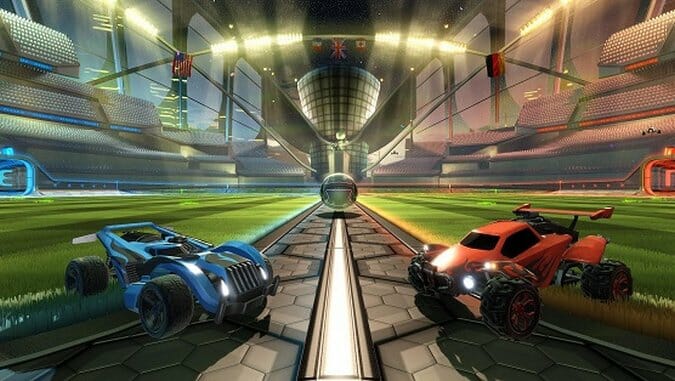Rocket League: Turning It Up to Eleven

I used to hate soccer.
When I was younger it was the sport that the adults in my hometown made their children play in an ill-fated attempt to have them learn about sportsmanship and form invaluable friendships. Instead we were hellions who openly reviled each other. I remember growing accustomed to the taste of spring grass and wet dirt from falling on my face so much, and watching two of my teammates beat on each other after practice because one of them said something crude about the other’s mother. There were moments though, things I haven’t thought about in more than a decade, like when I fended off three forwards with some tricky footwork and even scored a few goals thanks to a shred of skill and a lot of luck. Brief instances where I, the gangly buffoon, found himself stumbling into a rare, exhilarating state of self-respect.
Now, years later, Rocket League is the only game I’ve played that’s captured the truly exciting bits of the sport for me. The vast majority of (the admittedly few) sports games I’ve played are so beholden to seasonal statics that I’m just always so bored because I can’t be bothered to keep up with the annual Who’s Who of professional leagues. Rocket League’s touch of zaniness allows it to focus on the bare essentials of the game: there are the players, a ball, and two goals. There are no stat games here. No managing players. No fluff. Just soccer…with turbo-powered RC cars, and it’s all the better and more accessible for that.
It would have been pretty easy for Rocket League to lean hard into its sci-fi setting and give the players all sorts of powerups (missiles or shields) with which to cause a ruckus. Instead developer Psyonix, demonstrating that the sport itself is a strong enough game on its own, opted to create balanced gameplay instead. A caveat: there are yellow pads around the arena that refill a turbo meter when you roll over them, but the turbo function itself feels necessary to the game and isn’t powerful enough to allow for abuse; it’s the equivalent of a player sprinting down the field to kick the ball. Overusing it will probably cause you to ram the ball too hard for you to get it into the goal’s mouth, sending it flying off course to a corner of the stadium. The key to the game is to know when to tap the turbo at the precise moment in order for you to gain just the right amount of force to send that ball where it needs to go. Good luck getting to that point when you’re surrounded by opponents though.
Interestingly enough, your teammates pose just as much of a threat to your success as your enemies, especially if they’re bot players you can’t communicate with. Rocket League, like soccer, isn’t so much a game about carrying out a detailed plan as it is about how you and your teammates react to the unpredictable movements of the ball and your opponents on a second-by-second basis. I’ve often had the ball rammed out from in front of me by a teammate who either didn’t see me in their peripheral vision or simply couldn’t pump the breaks in enough time to stop. I’ve done the same thing to a teammate quite a few times as well. This constant, frenzied back & forth of screwing up, recovering from screwing up, and turning someone else’s screw up into a score results in a experience that’s never really dull.
